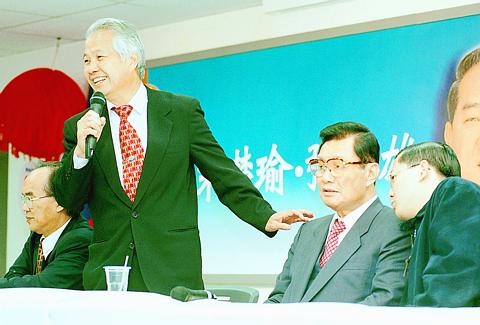Members of KMT breakaway James Soong's (宋楚瑜) political party have decided to directly elect their chairman, in an apparent bid to distinguish themselves from the defeated KMT.
"The party's members will directly elect their chairman," said Soong campaign manager and former Judicial Yuan president Liu Sung-pan (
Soong, who was expelled from the KMT after launching an independent presidential bid last year, has repeatedly criticized his former party's procedures as "undemocratic." He and his supporters argue that he would have won the KMT nomination if the party had allowed its members to choose their official candidate.

PHOTO: CHIANG YING-YING, TAIPEI TIMES
KMT Chairman Lee Teng-hui (李登輝) -- who quit his post yesterday under pressure to take responsibility for the party's resounding election defeat -- nominated Vice President Lien Chan (連戰) to be the party's candidate.
Following last week's election results, a growing number of grassroots members and legislators have echoed Soong's criticism of the KMT's procedures.
Taipei Mayor Ma Ying-jeou (馬英九) and top Lien campaign official Chen Shei-saint (陳學聖) are just a few of the prominent KMT members to advocate massive reform -- including a direct election of Lee's successor as chairman.
Ma, Chen and many of the party faithful blame the KMT's election defeat on the growing distance between the grassroots and its leadership.
In last week's presidential election, KMT candidate Lien won 2.9 million votes to Soong's 4.7 million. The KMT has 2 million registered members.
"Where are our members?" Ma asked on Sunday.
Ma and Chen said a direct chairmanship election should be top priority for a general congress to be held within the next few months.
As Soong and the KMT battle for party members, the issue of intraparty democracy could prove to be a hot issue.
Soong's camp decided to upgrade its populist image with a name change they said better reflects their ideals: the "People First Party" (
Soong, however, remains coy about whether he will chair his new party.
Yesterday, the United Evening News reported that Soong did not plan to act as temporary chairman, and that he wanted to be an "ordinary member."
"There is a good chance that the temporary chairman and the directly elected one will be different people," said Soong campaign staffer Chou Hsi-wei (周錫瑋) following the meeting yesterday. He declined to comment on who the temporary or permanent candidates would be.
There is a place for Soong whatever he decides to do, Liu said yesterday.
"Mr Soong will definitely be doing important political work for the party ... if he wants to be chairman, we won't argue," Liu said.
The party will choose a temporary chairman after the National Assembly elections in May, Liu said.

ACTION PLAN: Taiwan would expand procurement from the US and encourage more companies to invest in the US to deepen bilateral cooperation, Lai said The government would not impose reciprocal tariffs in retaliation against US levies, President William Lai (賴清德) said yesterday, as he announced five strategies to address the issue, including pledging to increase Taiwanese companies’ investments in the US. Lai has in the past few days met with administrative and national security officials, as well as representatives from various industries, to explore countermeasures after US President Donald Trump on Wednesday last week announced a 32 percent duty on Taiwanese imports. In a video released yesterday evening, Lai said that Taiwan would not retaliate against the US with higher tariffs and Taiwanese companies’ commitments to

‘SPECIAL CHANNEL’: Taipei’s most important tasks are to stabilize industries affected by Trump’s trade tariffs and keep negotiations with Washington open, a source said National Security Council Secretary-General Joseph Wu (吳釗燮) arrived in the US for talks with US President Donald Trump’s administration, a source familiar with the matter said on Friday. Wu was leading a delegation for a meeting known as the “special channel,” the Financial Times reported earlier. It marked Trump’s first use of the channel since returning to the White House on Jan. 20. Citing a source familiar with the matter, the Financial Times reported that Minister of Foreign Affairs Lin Chia-lung (林佳龍) was also a part of the delegation. The visit came days after China concluded war games around Taiwan and amid Trump’s

Intelligence agents have recorded 510,000 instances of “controversial information” being spread online by the Chinese Communist Party (CCP) so far this year, the National Security Bureau (NSB) said in a report yesterday, as it warned of artificial intelligence (AI) being employed to generate destabilizing misinformation. The bureau submitted a written report to the Legislative Yuan in preparation for National Security Bureau Director-General Tsai Ming-yen’s (蔡明彥) appearance before the Foreign Affairs and National Defense Committee today. The CCP has been using cognitive warfare to divide Taiwanese society by commenting on controversial issues such as Taiwan Semiconductor Manufacturing Co’s (TSMC, 台積電) investments in the

HELPING HAND: The steering committee of the National Stabilization Fund is expected to hold a meeting to discuss how and when to utilize the fund to help buffer the sell-off The TAIEX plunged 2,065.87 points, or 9.7 percent, to close at 19,232.35 yesterday, the highest single-day percentage loss on record, as investors braced for US President Donald Trump’s tariffs after an extended holiday weekend. Amid the pessimistic atmosphere, 945 listed companies led by large-cap stocks — including Taiwan Semiconductor Manufacturing Co (TSMC, 台積電), Hon Hai Precision Industry Co (鴻海精密) and Largan Precision Co (大立光) — fell by the daily maximum of 10 percent at the close, Taiwan Stock Exchange data showed. The number of listed companies ending limit-down set a new record, the exchange said. The TAIEX plunged by daily maxiumu in just